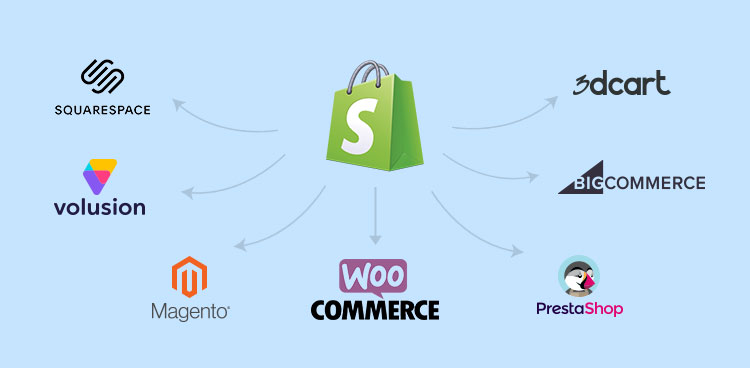Shopify has undoubtedly established itself as a leading e-commerce platform, empowering businesses to create and manage online stores effortlessly. However, it may not be the perfect fit for everyone. Whether you're looking for more customization options, a different pricing structure, or specific features, there are several noteworthy alternatives to Shopify. In this article, we'll explore some of the top Shopify alternatives to help you make an informed decision for your online business.
1. WooCommerce
Overview: WooCommerce is a powerful e-commerce plugin for WordPress, offering a flexible and customizable solution for online store owners. It seamlessly integrates with existing WordPress sites, providing a familiar environment for users already accustomed to the WordPress platform.
Pros:
- Flexibility: With countless plugins and themes available, WooCommerce offers unparalleled flexibility and customization options.
- Cost-Effective: WooCommerce itself is free, but you may incur costs for hosting, themes, and extensions.
- WordPress Integration: Perfect for users already familiar with WordPress, it seamlessly integrates into WordPress websites.
Cons:
- Learning Curve: Beginners might find it challenging to navigate the vast array of customization options.
- Technical Maintenance: Users need to manage their own hosting and perform regular updates.
2. BigCommerce
Overview: BigCommerce is a fully hosted e-commerce platform that caters to businesses of all sizes. It provides a range of features, including hosting, security, and scalability to accommodate growing businesses.
Pros:
- Scalability: BigCommerce is designed to scale with your business, making it suitable for both small startups and large enterprises.
- Built-In Features: It offers a wide range of built-in features, reducing the reliance on third-party apps.
- Multi-Channel Selling: Enables selling on various platforms, including Amazon, eBay, and social media.
Cons:
- Transaction Fees: Higher-tier plans may have transaction fees, which could impact overall costs.
- Design Limitations: While customization is possible, it may not be as extensive as some other platforms.
3. Magento
Overview: Magento is an open-source e-commerce platform known for its robust features and scalability. It's a popular choice for larger enterprises and businesses with complex requirements.
Pros:
- Scalability: Ideal for large businesses with extensive product catalogs and high traffic.
- Feature-Rich: Offers a wide range of built-in features, and additional extensions are available for further customization.
- Community Support: Being open-source, Magento benefits from a large community of developers and users.
Cons:
- Complexity: The platform can be complex, and beginners may find it challenging to set up without technical assistance.
- Resource Intensive: Requires powerful hosting to ensure optimal performance.
4. Wix eCommerce
Overview: Wix is a website builder that has expanded to include comprehensive e-commerce capabilities. It caters to users looking for an all-in-one solution with an easy-to-use interface.
Pros:
- User-Friendly: Wix offers an intuitive drag-and-drop builder, making it accessible to beginners.
- Affordable: Various pricing plans are available, allowing users to choose based on their budget.
- Design Templates: A wide selection of templates to create visually appealing online stores.
Cons:
- Less Customization: While user-friendly, Wix may not provide the same level of customization as other platforms.
- Not Ideal for Large Stores: Best suited for small to medium-sized businesses; larger stores may find it limiting.
5. Ecwid
Overview: Ecwid is an e-commerce solution that can be seamlessly integrated into existing websites, including platforms like WordPress, Wix, and Weebly. It's known for its simplicity and versatility.
Pros:
- Ease of Integration: Can be added to existing websites, eliminating the need to migrate to a new platform.
- Multichannel Selling: Allows selling on multiple platforms, including social media and marketplaces.
- Free Plan Available: Offers a free plan with basic features for small businesses.
Cons:
- Limited Features on Free Plan: Advanced features may require upgrading to a paid plan.
- Customization Challenges: Some users may find customization options limited compared to standalone platforms.
Conclusion
Choosing the right e-commerce platform is a crucial decision for the success of your online business. While Shopify is a popular choice, the alternatives mentioned above cater to diverse needs and preferences. Before making a decision, consider your specific requirements, budget constraints, and long-term goals. Each platform has its strengths and weaknesses, so take the time to explore and trial different options to find the one that aligns perfectly with your business vision. Whether it's the customization capabilities of WooCommerce, scalability of BigCommerce, robust features of Magento, user-friendliness of Wix, or integration flexibility of Ecwid, the ideal Shopify alternative awaits to elevate your online store to new heights.

